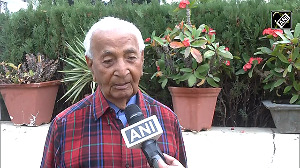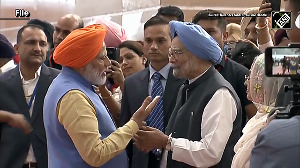Taking India's concern on board, the Non-Aligned Movement countries on Thursday vowed to combat terrorism in all its forms and manifestations, while making it clear that terror should not be associated with any religion, nationality, civilisation or ethnic group.
The 118-member grouping pledged to strengthen NAM solidarity by combating terrorism in all its forms and manifestations, in accordance with the principles of the United Nations Charter, international law and relevant international conventions.
The Sharm El-Sheikh Summit Declaration stressed that terrorism should not be associated with any religion, nationality, civilisation or ethnic group, and that further progress was required taking into account the positions and views of NAM members on issues like formulating a joint organised response of the international community to terrorism in all its forms and manifestations.
The document takes on board the call made by Prime Minister Manmohan Singh to NAM countries -- that it was time they agreed on a Comprehensive Convention on International Terrorism.
In his forthright speech at the plenary session of the two-day summit, Dr Singh made it clear that terrorists and those who aid and abet them must be brought to justice. Though he did not name Pakistan, it was clear from Dr Singh's remarks which country it was aimed at.
Dr Singh said the terror infrastructure must be dismantled and there should be no safe havens for terrorists because they do not represent any cause, group or religion.
The declaration said the NAM countries stood together with China and the Group of 77 countries, to press for fundamental reform of the international economic and financial systems and architecture, to address its flaws that have come into the spotlight in the wake of the global financial crisis.
"We commit further to enhance the voice and participation of developing countries in international decision making and norm setting, including in international financial institutions," it said.
The document said in all such steps taken to respond to the crisis, it must be ensured they were not taken at the expense of developing countries.
On the expansion of the Security Council, the declaration sought the 'expeditious' reform of the top UN body.
"The expeditious reform of the Security Council through its expansion and improvement of its working methods should continue to be a priority for NAM, taking duly into consideration the views of all NAM member states," it said.
On sanctions imposed on some NAM countries, the declaration rejected them as 'unilateral', which also was in contradiction with international law and the purposes and
principles of the UN Charter.
The declaration sought to ensure food security for all the member states of the NAM and promised to work with the UN and its agencies to decisively deal with the short, medium and long term actions needed, including the need to address trade and agricultural related aspects within the current negotiations in the Doha round.
On the issue of climate change, it vowed to strengthen the political momentum in preparation for the Copenhagen conference in December in a manner that reflected the views of the NAM countries with regard to issues like mitigation, adaptation, finance, technology transfer, capacity building and shared vision.
To shape a comprehensive UN energy agenda, the document said the NAM countries would work for the creation of an effective mechanism to transfer advanced energy technologies to developing nations, with the aim of achieving the Millennium Development Goals and dealing effectively with the challenge of climate change.






 © 2024 Rediff.com -
© 2024 Rediff.com -